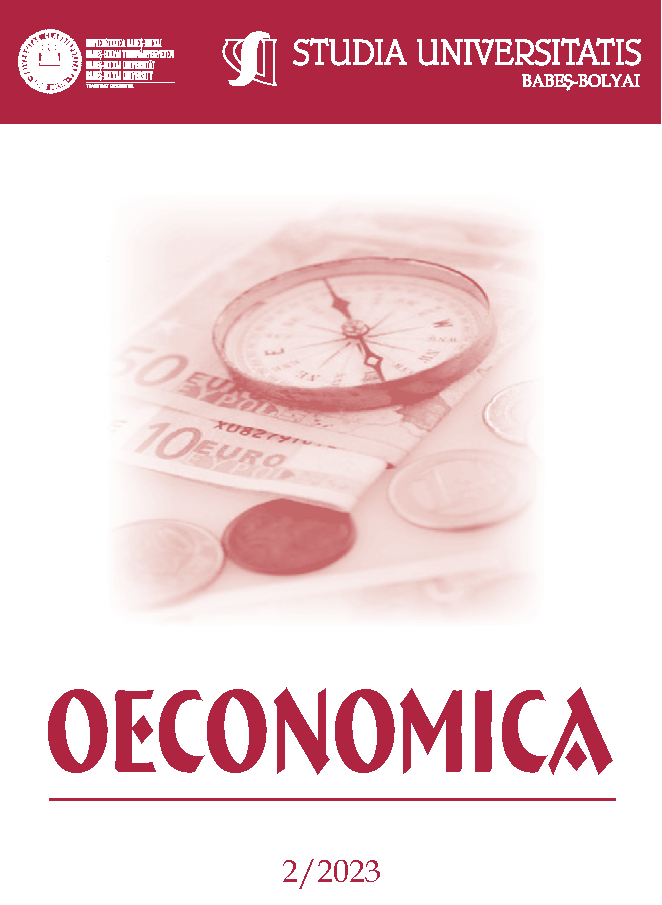INVESTIGATING STUDENTS’ BEHAVIORAL BIASES IN REGARD TO FINANCIAL DECISION-MAKING
DOI:
https://doi.org/10.2478/subboec-2023-0008Keywords:
Herding behavior; Overconfidence; Mental accounting; Loss-aversion; Anchoring; Introspection; Financial knowledgeAbstract
The purpose of this paper is to examine the factors influencing the appearance of biases in the behavior of university students. The studied biases are herding behavior, overconfidence, mental accounting, loss-aversion, anchoring and introspection. Three main assumptions were formulated, one regarding the relationship between the biases and financial knowledge, another related to the impact of gender, and the third one presuming a possible explanatory power of the Cognitive Reflection Test results in relation with the heuristics. The findings present evidence regarding the significant influencing power of financial knowledge on the behavior of university students from Cluj-Napoca, suggesting that this aspect could be a possible solution in order to diminish the negative effects of some of the behavioral biases examined. Besides the importance of financial knowledge, the results emphasis the explanatory power of gender when considering the errors of herding, overconfidence, mental accounting and loss-aversion, showing that men tend to be more influenced by these errors. The third assumption proved to be false, indicating that the performance of students at the Cognitive Reflection Test does not have a great impact on the presence of the examined biases.
JEL classification: G00, G40, G41
References
Alghalith, M., Floros, C. and Dukharan, M. (2012), Testing dominant theories and assumptions in behavioral finance, The Journal of Risk Finance, 13, pp. 262 – 268
Alsabban, S. and Alarfaj, O. (2020), An Empirical Analysis of Behavioral Finance in the Saudi Stock Market: Evidence of Overconfidence Behavior, International Journal of Economics and Financial Issues, 10, pp. 73-86
Benartzi, S. and Thaler, R.H. (1993), Myopic Loss Aversion and the Equity Premium Puzzle, Working Paper No. 4369, National Bureau Of Economic Research, 1050 Massachusetts Avenue Cambridge, MA 02138 May 1993
Branch, B. (2014), Institutional economics and behavioral finance, Journal of Behavioral and Experimental Finance, 1, pp. 13-16
De Bondt, W. (2004), Introduction to the special issue on behavioral finance, Journal of Empirical Finance, 11, pp. 423 – 427
DeMarris, K. and Lapan, S.D. (2004), Foundations for research Methods of inquiry in Education and the Social Sciences, Lawrence Erlbaum Associates, Publishers, Mahwah, New Jersey
Di, W., Eckel, C., Murdoch, J. (2013), Introduction to Special Issue on Behavioral Consumer Finance, Journal of Economic Behavior & Organization, 95, pp. 126-129
Eliaz, K. and Schotter, A. (2010), Paying for confidence: An experimental study of the demand for non-instrumental information, Games and Economic Behavior, 70, pp. 304-324
Evstigneev, I.V., Schenk-Hoppé, K.R., Ziemba, W.T. (2013), Introduction: behavioral and evolutionary finance, Ann Finance, 9, pp 115–119
Frankfurter, G.M., McGoun, E.G., Allen, D.E. (2004), The prescriptive turn in behavioral finance, Journal of Socio-Economics, 33, pp. 449–468
Garcia, M.J.R. (2011), Financial education and behavioral finance: new insights into the role of information in financial decision, Journal of Economic Surveys, 00, pp. 1–24
Hall, C.C., Ariss, L., Todorov, A. (2007), The illusion of knowledge: When more information reduces accuracy and increases confidence, Organizational Behavior and Human Decision Processes, 103, pp. 277–290
Ritter, J.R. (2003), Behavioral Finance, Pacific-Basin Finance Journal, 11, pp. 429 – 437
Kliger, D., van der Assem, M.J., Zwinkles, R.C.J. (2014), Empirical behavioral finance, Journal of Economic Behavior & Organization, 107, pp. 421-427
Krishnamurti, C. (2009), Investment Management A modern guide to security analysis and stock selection, Chapter 8, pp 627–634, Springer-Verlag, Berlin Heidelberg
Matsumoto, A.S., Fernandes, J.L.B., Ferreira, I.K.L., Chagas, P.C. (2013), Behavioral Finance: A study of affect heuristic and anchoring in decision making of individual investors, Available at SSRN: https://ssrn.com/abstract=2359180 or http://dx.doi.org/10.2139/ssrn.2359180
Menkhoff, L. and Nikiforow, M. (2009), Professionals’ endorsement of behavioral finance: Does it impact their perception of markets and themselves, Journal of Economic Behavior & Organization, 71, pp. 318–329
Montier, J. (2010), The Little Book of Behavioral Investing: How not to be your own worst enemy, Published by John&Sons Inc., Hoboken, New Jersey
Morck, R. (2008), Behavioral finance in corporate governance: economics and ethics of the devil’s advocate, J Manage Gov, 12, pp. 179–200
Olsen, R.A. (2008), Cognitive Dissonance: The Problem Facing Behavioral Finance, Journal of Behavioral Finance, 9:1, 1-4, DOI: 10.1080/15427560801896552
Sekita, S., Kakkar, V., Ogaki, M. (2022), Wealth, Financial Literacy and Behavioral Biases in Japan: the Effects of Various Types of Financial Literacy, Journal of the Japanese and International Economies, 64, 101190
Shefrin, H. (2001), Behavioral corporate finance, Journal of Applied Corporate Finance, 14, pp. 113-124
Shefrin, H. (2006), The Role of Behavioral Finance in Risk Management, Risk Management A Modern Perspective, Chapter 29, pp. 653-676
Shiller, R.J. (2006), Tools for Financial Innovation: Neoclassical versus Behavioral Finance, The Financial Review, 41, pp. 1-8
Statman, M. (2008), What is behavioral finance, adapted with permission from Handbook of Finance, Vol. II, Chapter 9, Edited by Frank J. Fabozzi, Hoboken: John Wiley & Sons, Inc.: 79-84
Statman, M. (2014), Behavioral finance: Finance with normal people, Borsa Istanbul Review, 14, pp. 1-9
Toplak, M.E., West, R.F., Stanovich, K.E. (2011), The Cognitive Reflection Test as a predictor of performance on heuristics-and-biases tasks, Mem Cogn, 39, pp.1275–1289
Van der Sar, N.L. (2004), Behavioral finance: How matters stand, Journal of Economic Psychology, 25, pp. 425–444
Downloads
Published
How to Cite
Issue
Section
License
Copyright (c) 2023 Studia Universitatis Babeș-Bolyai Oeconomica

This work is licensed under a Creative Commons Attribution-NonCommercial-NoDerivatives 4.0 International License.






